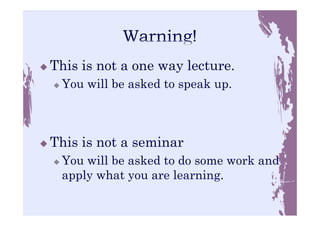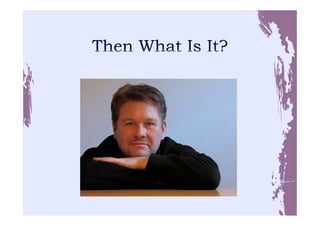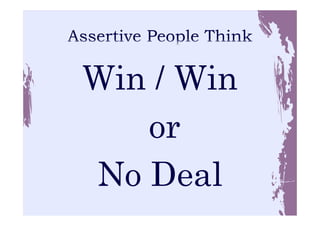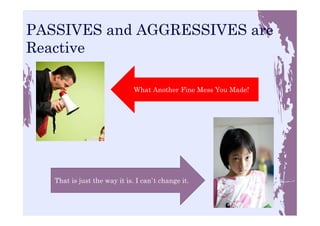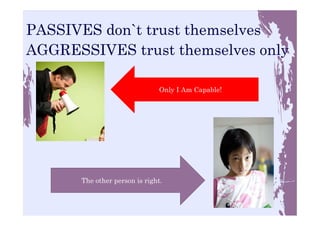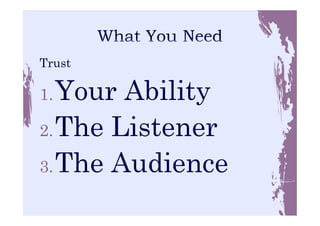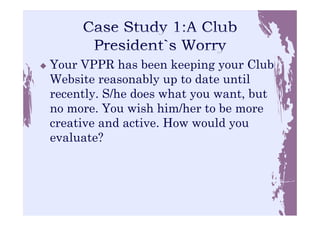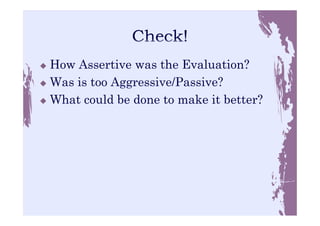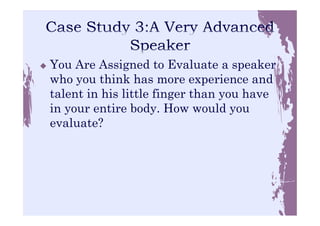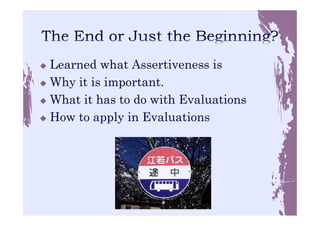Evaluate To Elevate
- 1. Evaluate to Assertiveness and A i d the Art of Evaluation Matthew D. Ownby April 18th 2009
- 2. What is Assertiveness, anyway? Why should I care? y What does this got to do with Evaluations? If it so great how do I get ? great,
- 3. This i Thi is not a one way lecture. t lt You will be asked to speak up. This i Thi is not a seminar t i You will be asked to do some work and apply what you are learning.
- 8. Q:?? Q ?? A:Assertiveness AA ti
- 10. “What if they What take it the wrong way?”?”
- 11. “They won`t They won t listen to li t t me.” ”
- 12. “I have nothing h thi important to say.” y”
- 13. “Who “Wh am I t to advise such ( ) (…) p person.””
- 14. Have you ever H had such thoughts? h gh ?
- 15. How did you overcome o ercome them?
- 16. Q:What is the best stance f stating for ig your opinion? A:Assertiveness AA i
- 17. What is Assertiveness, Assertiveness Anyway?
- 20. NOT EVEN THIS!
- 23. vs
- 24. Win / Win or No D l N Deal
- 25. PASSIVES and AGGRESSIVES are stuck in a WIN / LOSS Paradigm I`ve Got To Be Right! I` G T B Ri h ! I don`t want to cause discomfort.
- 26. Respect p
- 27. PASSIVES don`t respect themselves. p AGGRESSIVES don`t respect others. I am Right and E Ri h d Everyone K Knows It! I! There are lots smarter, more experienced ..
- 28. Proactive
- 29. PASSIVES and AGGRESSIVES are Reactive What A Wh Another Fi M h Fine Mess Y M d ! You Made! That is just the way it is. I can`t change it.
- 30. Trust
- 31. PASSIVES don`t trust themselves AGGRESSIVES trust themselves only Only A C O l I Am Capable! bl ! The other person is right.
- 32. Proactive Trust Win / Win Respect
- 33. So What Does This Have to Do Thi H tD With Evaluations? An Other Dissatisfied Customer
- 34. Everything
- 35. 1. To i 1 T give a positive assessment of the iti t f th things done right. 2. To provide constructive advise for the thing that can be done better better. 3. To get the listener to accept it. You have 2-3 minutes before …. bf
- 36. Respect Yourself 1. 2. The Listener 3 The Idea 3.
- 37. Trust Your Abilit Ability 1. 2. The Listener 3 The Audience 3.
- 38. Think Win/ Wi Thi k Wi / Win You re You’re Here to Help not to 1. 1 Lecture The Speaker Wants to Improve 2. You Can Both Grow Together 3.
- 39. Proactive P ti Think About What Is Best 1. 1 Say What You Want to Say 2. 2 Do What You What Want to 3. 3 Do
- 40. Start d E d ith Respect. St t and End with R t No Excuses, No Apologies Be Constructive, not Critical Confidently Give Advice and Praise
- 41. So N S Now it is i Time to
- 43. Assertiveness b A ti by the Case
- 44. Your VPPR has b Y h been keeping your Club k i Cl b Website reasonably up to date until recently. S/he does what you want, but no more. You wish him/her to be more creative and active. How would you evaluate?
- 45. How Assertive was the Evaluation? H A ti th E l ti ? Was is too Aggressive/Passive? gg What could be done to make it better?
- 46. You`ve b Y ` been a member of a club for long b f l bf l time. Recently while, over all the meeting and speech quality is good, you have some concerns over the overall management of the club and the treat member of guest and new members members. What would you say to the officers?
- 47. How Assertive was the Evaluation? H A ti th E l ti ? Was is too Aggressive/Passive? gg What could be done to make it better?
- 48. You A Assigned t E l t a speaker Y Are A i d to Evaluate k who you think has more experience and talent in his little finger than you have in your entire body. How would y y y you evaluate?
- 49. How Assertive was the Evaluation? H A ti th E l ti ? Was is too Aggressive/Passive? gg What could be done to make it better?
- 50. The Th person in charge of PR does very ih f d excellent work creating flyers, setting up a promotional website, etc. but tends take a long time, and is very slow at g , y actually promoting the contest to other clubs. clubs There are only two weeks left. left How would you Evaluate?
- 51. How Assertive was the Evaluation? H A ti th E l ti ? Was is too Aggressive/Passive? gg What could be done to make it better?
- 53. Learned what Assertiveness i L d h tA ti is Why it is important. y p What it has to do with Evaluations How to apply in Evaluations H liE l i


